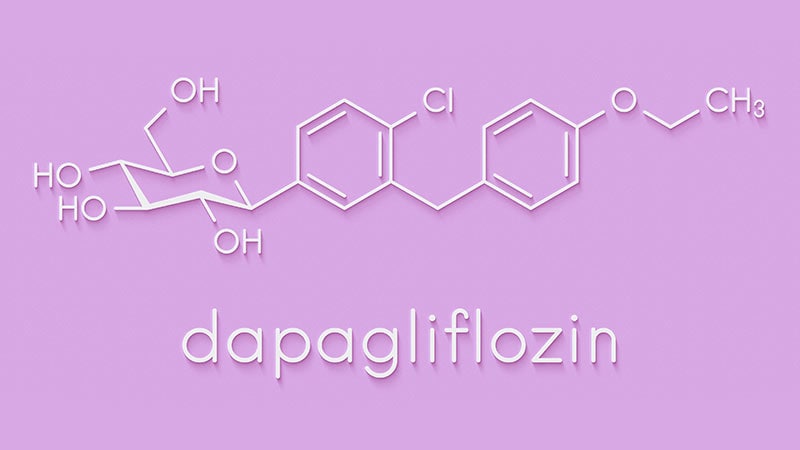TOPLINE:
When administered for 48 weeks, the SGLT2 inhibitor dapagliflozin alleviated steatohepatitis and fibrosis in patients with metabolic dysfunction-associated steatohepatitis (MASH) while demonstrating a favorable safety profile.
METHODOLOGY:
- MASH affects over 5% of adults and more than 30% of patients with diabetes or obesity. It is characterized by hepatic steatosis, lobular inflammation, and hepatocellular ballooning with accelerated progression of fibrosis, but treatment options remain limited.
- Researchers in China conducted a clinical trial from November 2018 to March 2023 to evaluate the efficacy and safety of dapagliflozin in 154 patients with biopsy-confirmed non-cirrhotic MASH (mean age, 35.1 years; 85% men), of whom 45% had type 2 diabetes. Most had liver fibrosis.
- Within 6 months of the screening liver biopsy, patients were randomly assigned to receive either 10 mg/d dapagliflozin or matching placebo orally for 48 weeks, after which a follow-up biopsy was performed.
- Body weight, waist circumference, blood pressure, physical activity, diet, and levels of blood glucose, insulin, lipids, and liver enzymes were assessed at enrollment and at multiple timepoints throughout the trial.
- The primary endpoint was alleviation of MASH at week 48, defined as either a decrease of 2 or more points in the nonalcoholic fatty liver disease activity score (NAS) or an NAS of ≤ 3, without any worsening of liver fibrosis.
TAKEAWAY:
- At week 48, MASH was alleviated without worsening fibrosis in 53% of patients in the dapagliflozin group compared with 30% of those in the placebo group (risk ratio [RR], 1.73; P = .006), with a mean difference of -1.39 in the NAS between groups.
- MASH resolution without any worsening of fibrosis at week 48 was achieved in 23% of patients in the dapagliflozin group compared with 8% of those in the placebo group (RR, 2.91; P = .01).
- Alleviation of fibrosis without worsening of MASH at week 48 was observed in 45% of patients in the dapagliflozin group compared with 20% of those in the placebo group (RR, 2.25; P = .001).
- Adverse events were less frequent in the dapagliflozin group than in the placebo group (56% vs 64%); only 1% and 3% of patients in the dapagliflozin and placebo groups, respectively, discontinued treatment due to adverse events.
IN PRACTICE:
“Given the shared pathophysiological mechanisms linking MASLD [metabolic dysfunction-associated steatotic liver disease], type 2 diabetes, and obesity, particularly insulin resistance and lipotoxicity, identifying therapeutic drugs capable of improving overall metabolic control while also targeting liver disease remains a key goal. Ideally, such treatments should provide cardiovascular benefit, have an established safety profile, and be accessible to broad and diverse patient populations,” experts wrote in an accompanying editorial.
SOURCE:
The study was led by Jiayang Lin, Department of Endocrinology and Metabolism, Nanfang Hospital, Southern Medical University in Guangzhou, China. It was published online on in BMJ.
LIMITATIONS:
Although the FDA guidance recommends using steatohepatitis resolution without fibrosis worsening or fibrosis improvement without steatohepatitis worsening as endpoints, this trial — registered and initiated before that guidance was published — used MASH improvement without worsening of liver fibrosis as its primary endpoint. The study population was limited to Chinese participants, potentially affecting broader generalizability. Additionally, the trial included a high proportion of male and relatively younger participants who were more willing to accept liver biopsy at screening, leading to underrepresentation of female and older patients.
DISCLOSURES:
This study was supported by grants from Noncommunicable Chronic Diseases-National Science and Technology Major Project, National Science Fund for Distinguished Young Scholars, Joint Funds of the National Natural Science Foundation of China, and other sources. The authors reported no conflicts of interest.
This article was created using several editorial tools, including AI, as part of the process. Human editors reviewed this content before publication.
Source link : https://www.medscape.com/viewarticle/popular-diabetes-drug-helps-treat-progressive-liver-disease-2025a1000fqr?src=rss
Author :
Publish date : 2025-06-12 11:09:00
Copyright for syndicated content belongs to the linked Source.
